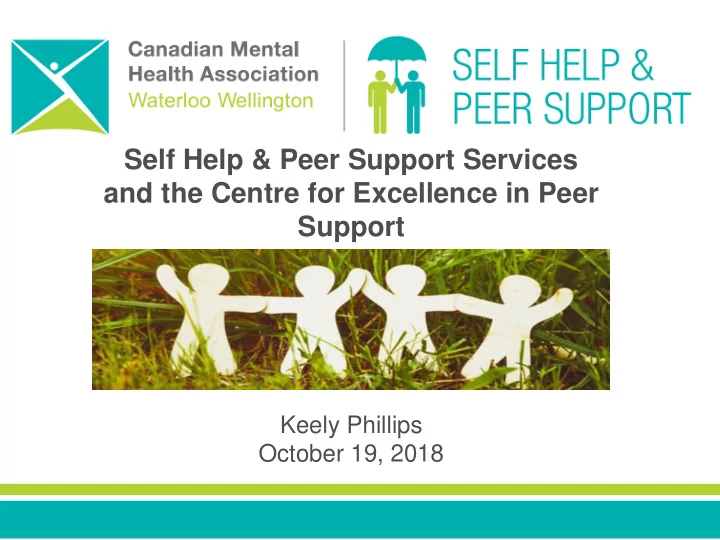

Self Help & Peer Support Services and the Centre for Excellence in Peer Support Keely Phillips October 19, 2018
About Self Help & Peer Support • Peer-led department of CMHA Waterloo Wellington • Three walk- in Recovery Centre’s (Kitchener, Cambridge, Guelph) that offer anonymous: – Peer support groups – Recovery skill groups – 1:1 peer support • Programming is grounded in valuing the learning that occurs on recovery journeys and improving self-management skills • Centre for Excellence in Peer Support works to strengthen the presence and practice of peer support throughout Waterloo- Wellington: – Provide organizations and their peer workers with consultation, training, and support in implementing and sustaining strong peer support programs – Research and evaluation on peer support
Average 8 groups / day and 6 ppl/ 50 people per day access group Recovery Centre's groups and 1:1 support (Self Help sites) Average 50 active • Kitchener volunteers • Guelph • Cambridge Entrepreneurship Advocacy Program Assistance 13 staff, 370 unique indivs, Self Help 2300 group sessions, & Peer 15,000 anon Support group participants Spark of Brilliance Beautiful Minds • Guelph • Kitchener Centre for Fee-for-service Excellence partnerships with 6 in Peer agencies Support 11 external, 14 Support internal peer workers Research and evaluation
Centre for Excellence in Peer Support
Supporting Peer Workers • Monthly Community of Practice meetings • Smaller team meetings • Annual retreat • On-going training and educational opportunities
Implementing Peer Support Roles in Mainstream Settings • Identified common role implementation issues for peer workers in non-peer settings • Created a set of reflective practice questions for agencies, supervisors, peer workers, and non-peer colleagues to address / prevent some of the issues
Access to Training accommodation Career pathway Application s and process Supervision advancement Clarity of purpose Using lived experience Cooptation Role clarity Common role Compensation implementation issues Resources to meet job Relationships requirements Identity conflict with service Employment users status Overworked and Maintaining Relationships overextended good mental with non-peer Isolation health and colleagues well-being
Supervising Peer Workers Toolkit • Coming in November! • Literature review is online • Toolkit will identify for non-peer supervisors: Why Effective Supervision Matters What Good Supervision Looks Like Why Careful Implementation Matters Partnering with a Peer Support Expert or a Peer-Led Organization What is Peer Support? Why is it unique? Are We Ready for a Peer Role? Welcoming a Peer Worker to the Team What a Successful Peer Role Looks Like Checklist Guidelines for Defining Tasks of Peer Worker Getting to Role Clarity When Peer Worker Duties Conflict With Values
Reflexive Practice Guidelines for Peer Support • The objective is to find out how we can best support peers who work among interdisciplinary teams and in mainstream mental health and addiction agencies. • How we can address some of the issues that we are finding when peers are working among interdisciplinary teams.
Site of Practice Paradigm Knowledge Medical Gender Specific Areas of Focus model Professional Education Cisgender University Health – Able bodied – minded/ Male DisAbilities of any type Health Religion Christianit y Able body/ mind Education – University/ College or Secondary School Age Group 35-60 White Race Knowledge – Professional/Lived Experience Hetero Western Site of Practice – Mainstream/CSI European Sexual Geographic Orientation Region Middle- North (Origin) Upper America English Social Class Geographic Region (Current) Language
Conestoga Peer Navigator A full-time peer worker on campus to build a peer support space and service for college students
Contact Information Keely Phillips Self Help & Peer Support, CMHA Waterloo Wellington kphillips@cmhaww.ca www.cmhawwselfhelp.ca
Recommend
More recommend